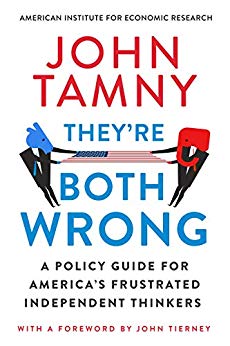Conservatives Need To Lay Off the Protectionist Nonsense

If sports talk shows are to be believed, Mondays are brutal for professional and college football players. Particularly those who play for teams that lost the Saturday or Sunday before.
Monday is the day in which film of the previous game is closely studied, and errors showcased. In sports there’s no sugarcoating or coddling. Errors are realized right away, often in humiliating fashion, and corrected. Those that don’t correct their mistakes are quickly benched, or released.
The truth about sports came to mind while reading Roger W. Robinson’s fallacy-riddled speech about China that was recently re-printed in Hillsdale College’s highly regarded (with good reason) Imprimis. The publication is associated with some of the greatest talks ever given by members of the conservative and libertarian movement, and it rightly enjoys a place of high prestige in the classical liberal pantheon. In time, the inclusion of Robinson’s flamboyant misunderstanding of basic economics will be viewed by Imprimis editors as one of those inevitable mistakes that all editors make.
It seems Robinson forgot just how crucial error realization is to individual progress, and by extension economic progress. Economies are just collections of individuals, and when they’re shielded from their errors they’re similarly blinded to what enables greatness. That’s why every elongated economic downturn always and everywhere has the fingerprints of an activist government all over it.
Recessions on their own are necessarily short simply because they’re the process whereby economic actors of all stripes engage in a figurative film study of the kind athletes endure on a weekly basis. This study of individual and corporate actions forces a necessary and quick realization of errors, the correction of bad habits, the shedding of employees who aren’t the right fit, along with the mothballing of investments and initiatives that aren’t working. In short, untouched recessions are the certain sign of recovery on the way. They’re the signal that everyone’s watching the proverbial film closely, and fixing what’s wrong.
Just as football teams make adjustments at halftime, and substantial adjustments following film study in the week after losses and wins, so do businesses do the same. If not, they slide toward mediocrity and eventually bankruptcy. Anything done to delay error realization invites stagnation, and this speaks to the horrors of government efforts to mitigate the pain of downturns. When government does this it necessarily slows recovery simply because these actions once again slow the corrections necessary for progress.
If only Robinson had thought about the above before he went public with his musings on China. As he puts it at speech’s end, “The Chinese are waging economic and financial warfare against us every day.” What Robinson’s saying is that China’s businesses are allied with the Chinese state on the way to an economic “war” with the U.S. If we ignore that exchange among producers is about cooperation as opposed to the “war” naively bruited by Robinson, it’s right here that we can see how misguided the former Reagan administration official is.
Crucial about the above is that Reagan himself would have well understood the basic misunderstanding informing Robinson’s thinking. Stated simply, businesses allied with the state aren’t very good or competitive as businesses. They aren’t because politics, as opposed to profit motive, drive their actions. Businesses allied with the state are weakened by the tie when it’s remembered that they needn’t rush toward the error realization without which there’s no progress. More to the point, businesses tied to the state can’t realize errors simply because the act of doing so almost invariably involves painful decisions of the layoff kind that politicians spending the money of others avoid like the plague.
After that, businesses that are tied to government are invariably subsidized by government. Not only do their political ties make tough decisions unlikely, those same ties make it unlikely that the company heads in control will rush to their mistakes in the first place. Why acknowledge error when government subsidies make it possible to ignore them to begin with?
Robinson adds around mid-speech that the Chinese state is pursuing a “Made in China 2025,” a strategy designed to dominate key technology sectors—from artificial intelligence and quantum computing to hypersonic missiles and 5G.” Reagan would have had a field day with this. One reason he was so confident in the Soviet Union’s eventual collapse was because he knew state-planning of its economy would fail, by definition. Reagan’s former minion in Robinson claims “China” is centrally planning how Chinese businesses will approach the future, which is the surest sign that, assuming Robinson’s analysis of China’s economy is correct (it isn’t), that the overnight protectionists (Robinson claims without evidence that President Trump’s “trade war is hurting China”) on the right needn’t worry about China. State planning of economic activity doesn’t work on all too many levels, but the main reason it doesn’t is that technological progress is as a rule a consequence of endless failure on the way to breakthroughs that are only arrived at after endless mistake realization.
The problem with the above (for China at least) is that the state control of economic activity once again buys off the failure that is necessary for progress. Reagan understood this truth too. As he used to regularly quip, “the closest thing to eternal life on earth is a government program.” When government is involved in anything, bad ideas beget more spending on what’s bad and isn’t working. Again, if China’s economy resembles what Robinson imagines (it doesn’t), then paranoid types like him have nothing to worry about.
Like all China critics, Robinson makes the typically tired arguments about IP theft and “forced technology transfers,” but what he doesn’t realize is that technology is anything but if it’s in the wrong hands. Goodness, the richest of rich U.S. technology geniuses routingly acknowledge that nearly everything they try fails, yet Robinson presumes the Chinese, perhaps for being Chinese (?), have the skills to identify what’s brilliant only to execute on it? If only life were so easy. Robinson insults American genius in presuming it can so easily be stolen, plus he insults the profit motive itself when he so childishly presumes that success is as simple as taking something and making it. In the real world, businesses of every stripe produce with great uncertainty given a basic understanding that what’s hot now in no way predicts what will be hot in the future.
On the subject of energy, Robinson calls for a repeat of the Reagan administration’s efforts in the ‘80s to limit the Soviet sale of natural gas to Europe. As he put it, “The Reagan administration drew the line on a project called the Siberian Gas Pipeline, a 3,600-mile twin-strand pipeline that stretched from Siberia into the Western European gas grid. If completed, not only would it become the centerpiece of the Soviets’ hard currency earnings structure, but Western Europe would become dependent on the USSR for over 70 percent of its natural gas, weakening Western Europe’s ties to the U.S. and leaving the continent open to Kremlin extortion.” It’s hard to know where to begin.
For one, if natural gas purchases from the Soviet Union would have made Western Europe “dependent on the USSR for over 70 percent of its natural gas,” which country or countries was Western Europe “dependent” on before the USSR? But the bigger question is one of who cares? Robinson makes the point throughout his speech about the alleged horrors of China’s modern existence, and that it, like the old Soviet Union, is very much reliant on hard currency to liquefy its economy. Ok, but if true then it’s a certainty that the USSR would never have ceased natural gas sales in the 1980s any more than “China” would withhold market goods today. Market share is hard won and rarely something given up, plus per Robinson’s own reasoning, the need for hard currency would overwhelm any illusory gain from a cessation of sales.
To which Robinson might respond that “China” could cease selling to us, and the “U.S.” could cease selling to China, as the U.S. allegedly did vis-à-vis the USSR and its pipeline partners in the 1980s. In Robinson’s words, “The U.S. at the time had a monopoly on oil and gas technology that could drill through permafrost—which we had developed for Alaska’s North Slope—and we imposed oil and gas equipment sanctions on the USSR and European companies that were helping to build the Siberian pipeline.” Robinson misunderstands that so long as U.S. companies were selling their oil and gas technology in the ‘80s, then they were by definition selling it to the Soviets assuming there was demand from them. Lest readers forget, there’s no accounting for the final destination of any good, service, or currency. That’s why there are Apple iPhones in Cuba, North Korea and Venezuela despite wholly symbolic U.S. “embargoes” on all three countries, and it’s similarly why the U.S. dollar liquefies economic activity in all three countries. Just the same, the so-called “Arab oil embargo” from the 1970s similarly failed completely when it came to keeping “Arab oil” out of the U. S. There’s once again no accounting for the final destination of anything, which wrecks Robinson’s economically bankrupt arguments in support of isolating China in terms of goods, services, and most of all, currency.
More on currency in a moment. Until then, it’s useful to continue addressing Robinson’s misunderstanding of energy, and energy flows. Robinson laughably claims it’s hard to find a “good actor” in China, but lauds a “secret deal” made with the allegedly benevolent Saudi Arabia in the 1980s in which we apparently “persuaded” them to “pump an additional two million barrels of oil per day and decontrolled prices at the wellhead in this country, knocking oil prices down to about $10 a barrel.” Supposedly this sped up the bankruptcy of our old nemesis the USSR. Reagan would have laughed at Robinson’s reasoning on the price of oil too.
As he explained about the oil price in 1981 in the form of a question, “were the OPEC nations raising the price of oil or were they simply following the same pattern of an ounce of gold, that as gold in this inflationary age kept going up, they weren’t going to follow our paper money downhill? They stayed with the gold price.” Reagan knew that the price of oil wasn’t high in the 1970s due to a lack of supply; rather it was nominally high because the dollar in which it was priced had been in freefall. The dollar’s decline reversed under Reagan when it’s remembered that he ran on reviving a dollar that had collapsed after President Nixon’s errant decision to delink the greenback from gold, followed by President Carter’s errant decision to continue talking the dollar down through Treasury secretary Michael Blumenthal. In short, what brought on the price of oil’s collapse to a price level that was still four times what it was before Nixon’s departure from Bretton Woods was a revived dollar, not a “secret deal” as Robinson naively speculates. As Warren Brookes explained about falling oil during the ‘80s, “in February 1981 President Reagan scooped the experts when he predicted that oil prices would soon fall because the price of gold had dropped over 20% since his election.” Oil’s decline was a dollar story, not one of supply.
Back to currency, on the matter of dollars liquefying China trade and investment in same, so long as U.S. financial interests are in the business of financing economic activity, dollars will circulate in size throughout China. That’s the case because money, like goods, flows to production. Always. This would still be every bit as true even if “Wall Street” were as patriotic as Robinson yearns it to be. As he so offensively put it, “you can’t appeal to Wall Street on the basis of patriotism.” Get it? Wall Street only cares about profits, not Robinson’s mercantilism. Except that all financial service companies are ultimately intermediaries of funds coursing toward their perceived highest use. If “American” financial firms turn up their noses to budding and existing Chinese genius, then others won’t. They’ll often do so with U.S. dollars that are never idle. So long as there’s wealth, it will be in motion. Translated: wealth created and saved stateside will find its way around the world – including China – so long as there’s economic activity that rates investment there.
Robinson laments that there are over 80 Chinese companies listed on the NYSE, and over 60 on the NASDAQ. Of course, glossed over by the China skeptic is that a U.S. stock exchange listing makes it much more likely that Chinese companies will pursue that which enhances their betterment as opposed to the yearnings of the Chinese state. Stock exchange listings make for transparency of the kind that conservatives used to cheer, not lament. Thank goodness U.S. financial exchanges are open to Chinese companies. Here’s hoping more, not fewer, list stateside. The more that the Chinese are economically engaged with the rest of the world, the lower the odds of conflict. The problem with the former Soviet Union is that quite unlike China, it had next to no economy. Those are the enemies to fear as they have nothing to lose from war. With China it’s the opposite.
Precisely because Chinese businesses do so much in the way of sales in the U.S., the Chinese state pursuing war with the U.S. would be pursuing the country’s economic collapse. If readers find this hard to contemplate, they need to imagine what would happen to Gucci if its executives made a point of thoroughly insulting residents of Beverly Hills and Manhattan on a daily basis. Such efforts would greatly weaken a company reliant on sales to the well-to-do in both locales. Just the same, war for China against the U.S. would involve the Chinese warring against the Chinese.
Crucial here is that what’s bad for the Chinese economically is bad for the U.S. Seemingly glossed over by Robinson is that one reason “Wall Street” is so intrigued by China is that the world’s greatest, most valuable companies (those would be U.S. companies) are similarly intrigued by China, and the potential for enormous growth there. Briefly, Apple sells a fifth of its iPhones in China, GM sells more cars in China than it does in North America, while China is presently the 2nd largest market for Nike and McDonald’s ahead of it soon being the largest. Does Robinson know something the world’s greatest companies don’t? The question answers itself.
Which brings us to how anti-free market Robinson’s speech was, and how very un-Imprimis it was by extension. Here Robinson wraps himself in Reagan’s greatness, while basically calling for the state to do something very un-Reagan like in the form of dictating to Wall Street and U.S. companies how they should operate, and how they should extricate themselves from a rapidly liberalizing nation. Worse is that Robinson is up front in his support of Trump’s efforts to damage U.S. consumers, workers and businesses through tariffs. Reagan was at least somewhat sheepish about tariffs as the cost of politics.
Beyond that, Robinson’s speech was sad for it exhibiting such little knowledge of a country populated by people whose relentless toil gives Americans a raise daily, and enables their pay-hike inducing specialization longer term. Missed by Robinson is that to get off of the airplane in China as an American is to feel more at home than anyone in the world, Chinese people included. American businesses are everywhere as a happy consequence of a love affair taking place between the increasingly acquisitive Chinese people and American goods. How sad then that irresponsible people like Robinson are in the process of trying to sabotage what is brilliant with mindless rhetoric rooted in an impressive misunderstanding in economics.
Imprimis can surely do better. As for Roger Robinson, who knows? At the very least we should lament his use of Ronald Reagan’s great name to make a very un-Reaganesque argument. Robinson chose to wrap himself in the person whose real achievements and actual understanding of economics made his lifted swagger possible.
This piece originally ran in RealClearMarkets












